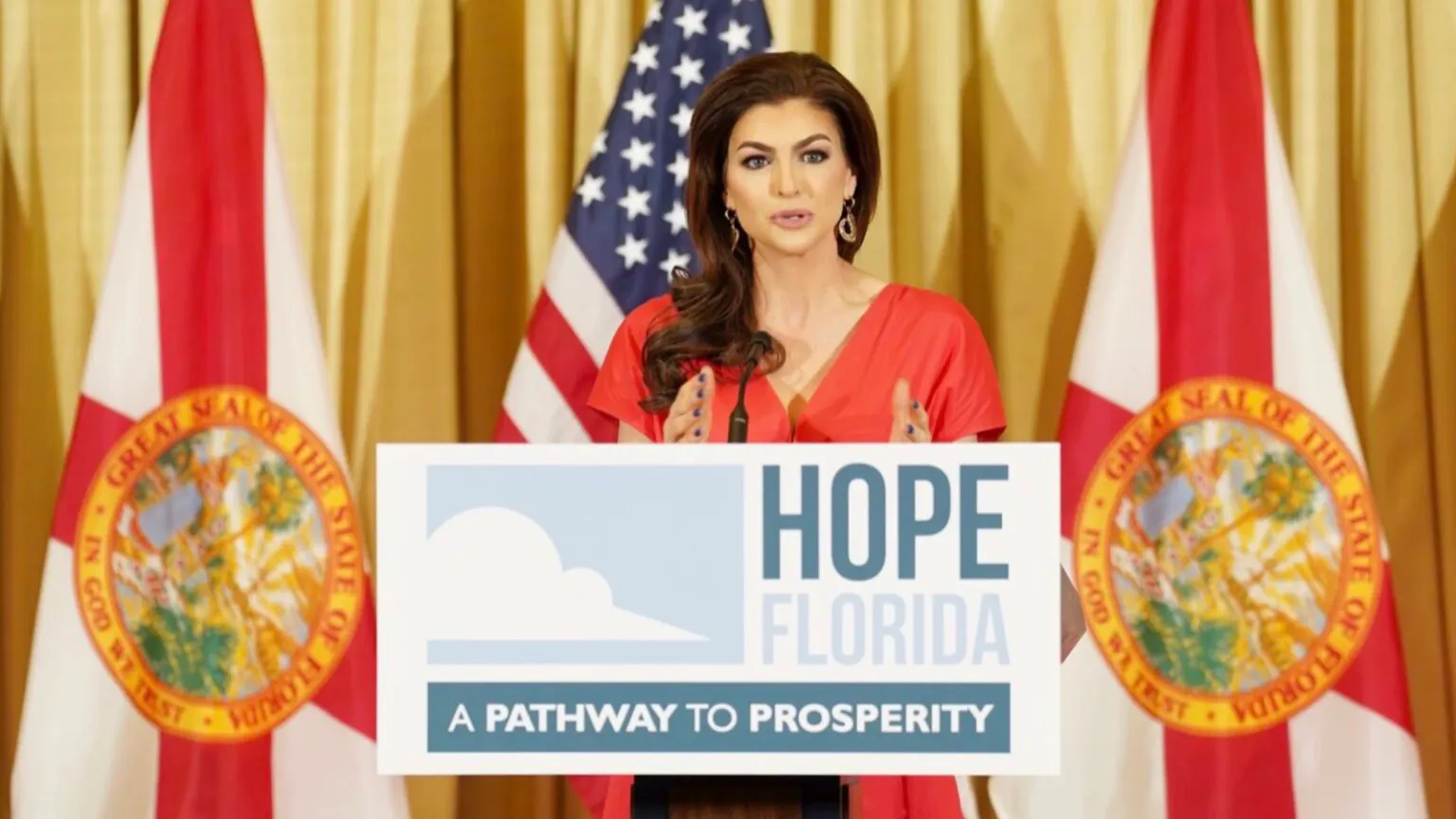Florida First Lady Casey DeSantis knows her Hope Florida program isn’t going to be the sexiest story in the news cycle. She knows it won’t drive social media clicks or spark heated debate on cable news panels. And yet, she’s hoping it transforms the way Americans think about government assistance.
Hope Florida first launched in September 2021 to provide a partnership between government agencies and faith-based organizations. Its aim was to offer deeper and more meaningful help to needy and struggling Floridians while at the same time providing greater accountability in how the state uses taxpayer money.
“I would go out and do press conferences early on in 2019 and people would talk about the child welfare sphere, for example,” DeSantis tells The Daily Wire. “They would look at other states and they would say, ‘Well, here’s what other states are spending per capita on this issue. And your spending is less.’ So by that they were implying that you need to spend more and that will result in the best outcomes. And that just isn’t the case. A lot of times, it’s just throwing money at these programs where you see a lot of bureaucracy and bloat and middle managers.”
To both eliminate the waste and achieve better outcomes, she spearheaded an initiative that would allow those receiving public benefits like youth in foster care or pregnant mothers struggling with substance abuse to share their needs on an online “care portal.” The portal would connect them directly to more than 1,000 faith-based organizations and other non-profits who could immediately provide everything from household items like food and furniture to help getting job training.
DeSantis chuckles at how competitive the faith-based organizations have become over grabbing opportunities to meet needs that come into the care portal. “I think it’s exciting to them because they’ll see a request come into their inbox and within seconds it’ll say, ‘Already been served,’ meaning the need has already been met. So there’s a competition to be the first to grab them. There’s really this hunger on the part of the community to accomplish the goals because they know somebody is out there who needs help, and it’s making it tangible.”
Another innovation has been transforming state agency employees into “hope navigators” who are assigned to individual families and participants.
An already overloaded single mom living out of her car may feel overwhelmed trying to figure out how to tap into different agencies to get help to feed her kids, find childcare, look for employment, and plug into vocational training. The hope navigator acts as a single point person who can assist her in meeting all of her needs, sparing her from the draining and demoralizing exercise of repeating her story to any number of government agents and non-profit workers.
DeSantis feels the navigators have been a crucial part of reimagining what public assistance looks like, both for those who need help and those providing it. “Instead of just saying, you know, ‘Here’s your [Temporary Assistance for Needy Families] payment, I’ll see you in six months, let me know how it goes,’ for the first time, these navigators tell me that they feel like they’re a part of the solution,” she says.
CLICK HERE TO GET THE DAILY WIRE APP
DeSantis believes this sense of making a difference explains why the program has a 91% retention rate in staffing: “Now the agency employees feel like they have an emotional investment in the success of the folks they are serving.”
Though it’s little more than 18 months old, Hope Florida is already showing impressive results. Forty-three percent of participants have been able to reduce or entirely eliminate their reliance on TANF and Supplemental Nutrition Assistance Program (SNAP) benefits. In a one-year period, the program’s success at helping people get to the point where they don’t need government assistance has saved taxpayers $11 million. It’s projected to save $120 million over ten years.
That success is why DeSantis announced on Tuesday that Florida is expanding Hope Florida to include the private sector as well. And she’s starting with the company California Governor Gavin Newsom is trying to cancel.
Newsom announced on March 8 that Walgreens isn’t welcome in the Golden State over its decision to abide by laws in 21 red states that restrict the distribution of abortion pills. “California won’t be doing business with @walgreens — or any company that cowers to the extremists and puts women’s lives at risk,” Newsom tweeted.
But in the Sunshine State, the company will be one of the first private businesses signing up for the provider side of the care portal to meet the needs of vulnerable and struggling Floridians. DeSantis believes that the participation of the private sector will enhance the effectiveness of the program all the more.
“There’s so many great things that are happening at the community level,” she says. “But those doing the work were siloed. You’d have the nonprofits in one bucket, you have the private sector in another, and you have the faith-based community in another. They’re all doing wonderful things, but up until this point, they really hadn’t had a collaborative way of working with government.”
To DeSantis, Hope Florida is a way of fulfilling Reagan’s vision of limiting the size and scope of government bureaucracy while also harnessing the power it has to help.
“It offers everyone a way to be a part of the solution, to make a difference while still being a good steward. It’s about organizing and creating a plan for somebody who is in need to get on a path to economic self-sufficiency and prosperity,” she says. “But it does it not by growing government but by maximizing resources and actually getting people off of government assistance and helping them live up to their God given potential and achieve the American dream.”

.png)
.png)

